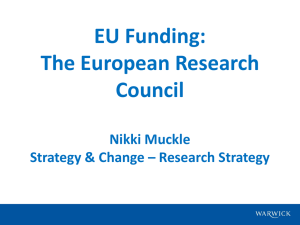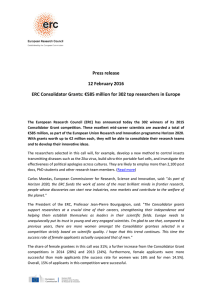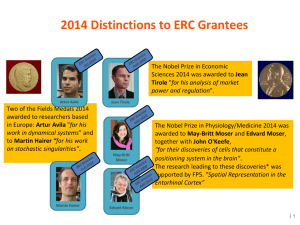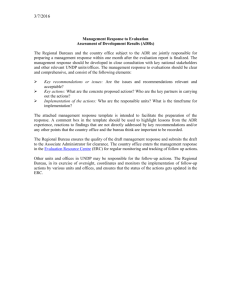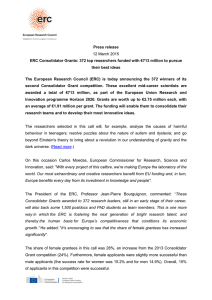Press release €575 million to 312 mid-career top ERC Consolidator Grants: Nearly
advertisement
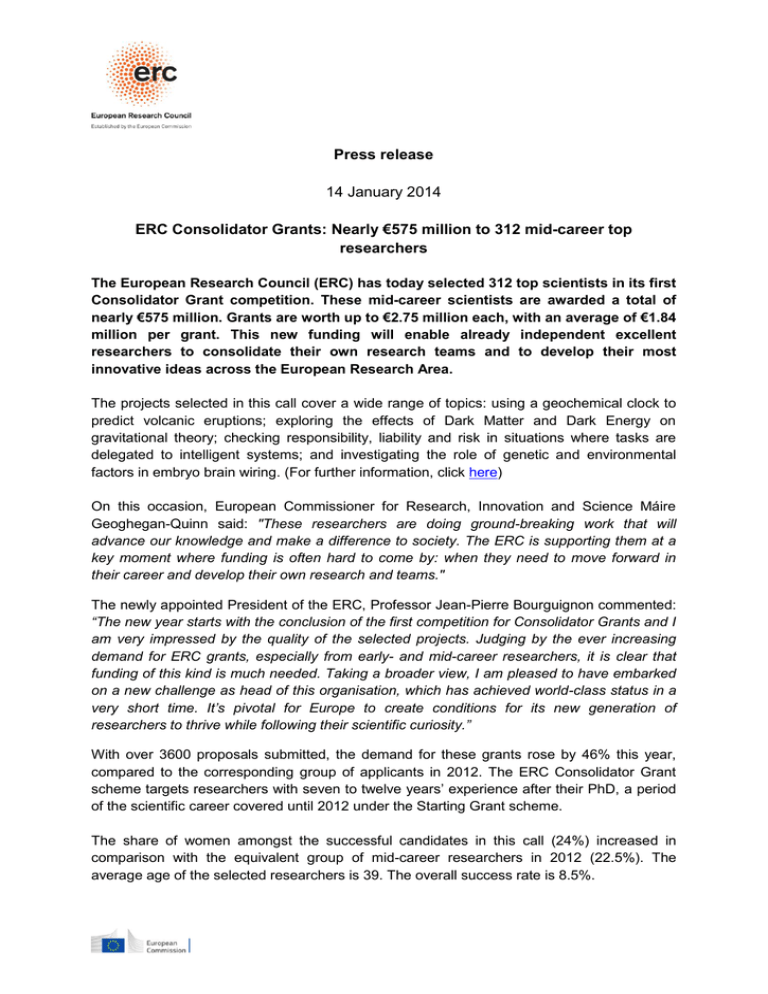
Press release
14 January 2014
ERC Consolidator Grants: Nearly €575 million to 312 mid-career top
researchers
The European Research Council (ERC) has today selected 312 top scientists in its first
Consolidator Grant competition. These mid-career scientists are awarded a total of
nearly €575 million. Grants are worth up to €2.75 million each, with an average of €1.84
million per grant. This new funding will enable already independent excellent
researchers to consolidate their own research teams and to develop their most
innovative ideas across the European Research Area.
The projects selected in this call cover a wide range of topics: using a geochemical clock to
predict volcanic eruptions; exploring the effects of Dark Matter and Dark Energy on
gravitational theory; checking responsibility, liability and risk in situations where tasks are
delegated to intelligent systems; and investigating the role of genetic and environmental
factors in embryo brain wiring. (For further information, click here)
On this occasion, European Commissioner for Research, Innovation and Science Máire
Geoghegan-Quinn said: "These researchers are doing ground-breaking work that will
advance our knowledge and make a difference to society. The ERC is supporting them at a
key moment where funding is often hard to come by: when they need to move forward in
their career and develop their own research and teams."
The newly appointed President of the ERC, Professor Jean-Pierre Bourguignon commented:
“The new year starts with the conclusion of the first competition for Consolidator Grants and I
am very impressed by the quality of the selected projects. Judging by the ever increasing
demand for ERC grants, especially from early- and mid-career researchers, it is clear that
funding of this kind is much needed. Taking a broader view, I am pleased to have embarked
on a new challenge as head of this organisation, which has achieved world-class status in a
very short time. It’s pivotal for Europe to create conditions for its new generation of
researchers to thrive while following their scientific curiosity.”
With over 3600 proposals submitted, the demand for these grants rose by 46% this year,
compared to the corresponding group of applicants in 2012. The ERC Consolidator Grant
scheme targets researchers with seven to twelve years’ experience after their PhD, a period
of the scientific career covered until 2012 under the Starting Grant scheme.
The share of women amongst the successful candidates in this call (24%) increased in
comparison with the equivalent group of mid-career researchers in 2012 (22.5%). The
average age of the selected researchers is 39. The overall success rate is 8.5%.
The ERC calls target top researchers of any nationality based in, or willing to move to,
Europe. In this call, grants are awarded to researchers of 33 different nationalities, hosted in
institutions located in 21 different countries throughout Europe, with nine of them hosting five
grantees or more. In terms of host institutions, the UK (62 grants), Germany (43) and France
(42) are in the lead. Researchers are also hosted in the Netherlands, Switzerland, Spain,
Italy, Israel, Belgium, Sweden, Austria, Denmark, Finland, Portugal, Greece, Hungary,
Ireland, Turkey, Cyprus, the Czech Republic and Norway. In terms of researchers'
nationality, Germans (48 grants) and Italians (46) are at the top, followed by French (33),
British (31) and Dutch (27) researchers. (See statistics here).
Around 45% of the grantees selected are in the domain 'Physical Sciences and Engineering',
37% in 'Life Sciences' and almost 19% in 'Social Sciences and Humanities'. The grantees
were selected through peer review evaluation by 25 panels composed of renowned scientists
from around the world.
The grants in this latest competition will allow the scientists selected to engage in total an
estimated 1100 postdocs and PhD students as ERC team members. As a result the ERC
contributes to the development of a new generation of top researchers in Europe.
The 2014 ERC ‘Consolidator Grant’ call, the first one under Horizon 2020, is already open
and the deadline for all domains in this call is 20 May 2014.
Lists of selected researchers
The lists below show the proposals selected for funding.
LIST of all selected researchers by country of host institution (alphabetical order within
each country group)
Lists of selected researchers by domain (in alphabetical order):
Physical Sciences and Engineering
Life Sciences
Social Sciences and Humanities
STATISTICS - Consolidator Grants call (indicative)
DISCOVER MORE PROJECTS in this Consolidator Grants call
Background
Set up in 2007 by the EU, the European Research Council is the first pan-European funding
organisation for frontier research. It aims to stimulate scientific excellence in Europe by encouraging
competition for funding between the very best, creative researchers of any nationality and age. The
ERC also strives to attract top researchers from anywhere in the world to come to Europe. It funds
young, early-career top researchers ('ERC Starting Grants'), already independent excellent scientists
('ERC Consolidator Grants'), and senior research leaders ('ERC Advanced Grants'). The substantial
funding can amount to a maximum of €2 million for a Starting Grant, €2.75 million for a Consolidator
Grant and €3.5 million for an Advanced Grant.
The ERC operates according to an "investigator-driven" (or "bottom-up") approach, allowing
researchers to identify new opportunities in any field of research, without thematic priorities. From
2007 to 2013 under the seventh EU Research Framework Programme (FP7), the ERC's budget was
€7.5 billion. Under the new Framework Programme for Research and Innovation (2014-2020), Horizon
2020, the ERC has a substantially increased budget of over €13 billion.
Since its launch, the ERC has funded some 4000 researchers and their frontier research projects and
has become a "benchmark" for the competitiveness of national research systems, complementing
existing funding schemes at national and European levels.
The ERC is led by the ERC Scientific Council, composed of 22 top scientists and scholars, including
the ERC President Professor Jean-Pierre Bourguignon, who took office on 1 January 2014. The ERC
Executive Agency implements the ERC component of the Horizon 2020 Programme and is led by
Director Pablo Amor.
Due to increasing submission numbers, since 2013 the ERC Starting Grant scheme has been split in
two: the ERC Starting Grant, for researchers with at least 2 and up to 7 years' experience after their
PhD; and the new ERC Consolidator Grant for researchers with over 7 and up to 12 years' experience
after their PhD. The 2012 Starting Grant call had two sub-streams ("starters" and "consolidators"),
which corresponded to the current division. Any comparative analyses made in this press release are
based on the equivalent categories in previous calls (7–12 years post-PhD experience).
The ERC Consolidator Grant in brief
For top researchers of any nationality and age, with over 7 and up to 12 years of experience after
PhD, and a scientific track record showing great promise.
Based on a simple approach: 1 researcher, 1 host institution, 1 project, 1 selection criterion:
excellence.
Host institution should be based in the European Research Area (EU Member States plus
countries associated with the EU research programme). No consortia. No co-funding is required.
Funding: up to €2.75 million per grant for up to 5 years.
Calls for proposals: published annually. See updated information on the upcoming calls here.
For more information
ERC website
Striking ERC-funded projects
Announcement on 2013 Consolidator Grant submissions
ERC Press Contacts
Madeleine Drielsma (Press and Communication adviser)
Tel: +32 (0)2 298 76 31
erc-press@ec.europa.eu
Maud Scelo (Press and Communication adviser)
Tel: + 32 (0)2 298 15 21
erc-press@ec.europa.eu
